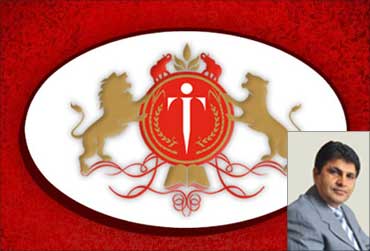
'Correct the anomaly on abatement in few IT products categories like printers'
Alok Bhardawaj, Sr. Vice President, Canon India
I would also expect in the budget, the correction of the anomaly in few IT products categories like printers on abatement.
The government had amended the duty structure basis from value based to retail price based with an abatement of 20 per cent. This abatement is quite low and the industry still requires the support of the government to increase it to 30 per cent so that freight reduction of 10 per cent can be passed on to the consumers.
The budget should put more thrust towards infrastructure development so that the economy grows at a higher pace. It is a good time for further reforms, which will bring in more economic growth.
There is also opportunity for various IT applications in sectors like education, healthcare, agriculture and e-governance.
I hope that the budget would include more initiative on technology development to enhance the quality of government service to citizens.
What do you expect from the forthcoming Budget for 2010-11? Tell us!

"Extension of STPI benefits to IT & ITeS must for growth in commercial real estate sector"
Samson Arthur, GM (India), Quinn group Samson Arthur, GM (India), Quinn group said, The extension of Software Technology Park of India (STPI) benefits for a definite longer term period is imperative to foster growth of small and medium IT and ITeS enterprises.Such measures should be taken prominently to improve export revenues in India, thus providing an opportunity for leasing of more space to these companies.
As the global economy begins its emergence from difficult recessionary times, India continues to post impressive year-on-year growth. This does not mean however that the Indian economy has been unaffected by the global economic crisis. Quite the contrary, the decline in international demand for goods and services has lead to a significant reduction in export-led revenue earned by India based companies - indigenous and multinationals alike.
Being heavily influenced by the financial standing and outlook of its customers, a drop in their revenue has in turn reduced demand for local real estate space.
This impact has unfortunately been further exacerbated by the postponement of real-estate investment decisions by companies planning to enter or expand their operations in India.
In view of the changed environment of economy, the budget for the next financial year has to deal with the challenges being faced by the industry. Government has thus far seemed mindful of the challenges being experienced by export-led Indian companies. This is positive for the real estate sector.
We hope to see this continue and perhaps further support provided, where possible, through the introduction of targeted support measures in the forthcoming Budget. Infrastructure plays a pivotal role for all development related activities, steps taken towards development of infrastructure will have an immense impact on the real estate sector and will aid its faster growth.
What do you expect from the forthcoming Budget for 2010-11? Tell us!

"Rationalize and simplify tax structure for the food and beverage industry"
Lalit Sethi, Chief Financial Officer, Tilaknagar Industries (TI) said, "India has a well-developed tax structure with clearly demarcated authority between Central and State Governments and local bodies.
In last 10-15 years, Indian taxation system has undergone tremendous reforms. The tax rates have been rationalized and tax laws have been simplified resulting in better compliance, ease of tax payment and better enforcement. The process of rationalization of tax administration is ongoing in India.
TI strongly feels the need of rationalizing and simplifying the tax structure, especially for the food and beverage industry. Although primary agricultural commodities are predominantly enjoy tax exemptions, processed foods are subjected to multiple levies. There is therefore an urgent need to rationalize and simplify the tax structure.
TI understands that our Finance Minister has a daunting task ahead of him of effectively striking a balance addressing the interests of the common man and garnering more revenue for a sustained, inclusive growth. At the current juncture of shaky economic revival, the question looming large is whether the economy would be able to sustain the recovery if the fiscal stimulus package is withdrawn.
Two major tax reforms, namely the new Direct Tax Code (DTC) and the Goods and Services Tax (GST) are on the anvil and people would want to know what contours these proposed tax reforms will assume.
The government's stated intent is to bring stability, simplicity and rationalisation in the tax structure. This is indeed a welcome move and should be further backed by continuous strengthening of the tax administration."
What do you expect from the forthcoming Budget for 2010-11? Tell us!

'SEZ policy should be revised to encourage smaller size SEZ'
Hanuman Tripathi, CEO & Managing Director, InfraSoft Technologies
Sharing his views on upcoming Union Budget 2010-11, Hanuman Tripathi, CEO & Managing Director, InfraSoft Technologies, said, "I feel that SEZ policy should be revised to create a push for building smaller size SEZ within city limits of all major towns reserved for SME companies in IT services, inclusion of Tax holidays (Service Tax and Excise exemptions) to domestic software companies serving Financial Inclusion & Rural Empowerment with their technology and rationalization of perquisite value for ESOPs for non-listed companies to Book Value or any other rationalized model to attract entrepreneurial quality of people to join the sector for longer term. Additionally, I also expect an extension of Tax holidays for IT exporters under the STPI scheme. If the government has reservations, this extension can be limited to IT companies under Rs 500 Cr revenues (SMEs) which do not have access to SEZs. "
What do you expect from the forthcoming Budget for 2010-11? Tell us!

Sandesh Kirkire, CEO, Kotak Asset Management Company
Sharing his views on upcoming Union Budget 2010-11, Sandesh Kirkire, CEO, Kotak Asset Management Company said, "The approaching date of the Union budget 2010 has all the potential ingredients to make it an eventful occasion.The fact that this budget is first such after the growth rebound of the Indian economy is not lost of the industry stalwarts. And therefore, the upcoming union budget assumes significance not just because it is the biggest annual policy event, but also because of its vital importance in determining the future pace of the Indian economy.
The upcoming budget may be largely centered around the reintroduction of the fiscal prudence measures; while also ensuring that the demand buoyancy in the economy is maintained. The high fiscal deficit of 6% and above, which has been incurred in the last two financial years, may see marginal curtailment. However, the actual quantum of the gilt supply may not taper off as yet.
In other words, the magnitude of the fiscal deficit may largely remain as it was in the previous year, but counting on the reinvigorated tax collection buoyancy, we may see some reduction in the 'fiscal deficit to GDP' percentage. Also, further activation of the divestment procedure to manage the deficit seems likely.
Another aspect of the budget that may attract attention: is the policy willingness to continue with the indirect stimulus package to the industry. As per the estimates, the fiscal burden of the three-pronged package in the 'Dec 08-Mar 09' period accounted for nearly 1.8% of the GDP. The continuation, or a more gradual withdrawal of this package, is what the industry has come to expect from the upcoming budget. Lest it unduly hamper the demand cushion and upset the apple cart.
The tax rationalization too has been the long-standing demand of the industry. The groundwork for the introduction of the Goods & Services Tax in the forthcoming budget will be a welcome initiative in an otherwise delayed implementation. Added to that, further clarity in the implementation and the timeline of the new Direct Tax code is also an eagerly awaited budgetary announcement.
Albeit, the Exempt-Exempt-Tax approach of the proposed Direct tax code may have some deterring impact on the small investor, and may therefore require further tinkering. In the same vein, further revaluation of the corporate tax and the minimum alternative tax rate too seems possible.
This is also the time to re-look at the entire subsidy regime viz, the fuel and fertilizer in particular. A roadmap for the gradual withdrawal of these subsidies and a more direct approach of reaching the important "bottom of the pyramid" constituents is the need of the day.
From the Mutual Funds industry perspective, the presence of the inter-industry regulatory arbitrage has to be addressed. Moreover, it has been a long standing demand of the industry to accord Equity FoF schemes an evenhanded tax status with other diversified equity schemes.
Besides that, the budgetary policy outlining of the FDI in the infrastructure and the education sector, may be a possibility. To add to which, the upcoming budget may provide further road map on the 3G auction process.
In conclusion, it will require particular dexterity from the Finance Minster in ensuring social and economic development while managing the fiscal deficit. It is not just the year but the future at stake!"What do you expect from the forthcoming Budget for 2010-11? Tell us!

Ravi Pandit, Chairman and Group CEO, KPIT Cummins Infosystem
Ravi Pandit, Chairman and Group CEO, KPIT Cummins Infosystem said, "The sunset clause needs to be extended because there are couple of issues relating to the SEZ clause vis a vis the STPI. As you know in the case of STPI a company can operate from any place and still qualify for STPI benefits, whereas under the SEZ scheme the company has to be located at a particular geographic location.
Typically the SEZ scheme seems to be more convenient for the larger units whereas STPI is also applicable for smaller units and people have benefited substantially. Considering the current conditions in the global market, I think the software companies would need to be more innovative and also be more cost conscious and from this perspective it would be useful to extend the STPI scheme for around 5 years.
As more and more companies are looking at domestic market, they are liable for various VAT and other Service taxes. Both put together there is a fairly large sum of taxation (10.3% and almost 8%) and this needs to be reduced.
Auto industry is going through a lot of changes and there's a requirement for sustained growth. Currently there is excise duty concession on electric vehicles but since there are very few electric vehicle in India it is not of much help. There should be a reduction of excise duty on hybrid vehicles as this would help make a mark".
What do you expect from the forthcoming Budget for 2010-11? Tell us!

Infrastructure status to be accorded to integrated township projects
Ahmed Shakir, Managing Director, ETA Star Property Developers Ltd
Ahmed Shakir, Managing Director, ETA Star Property Developers has quoted that, the real estate industry which has back on track expects the budget to consider according infrastructure status to integrated township development projects.This will enable the developers to raise funds at cheaper rates and relaxed norms especially when there is increasing demand for affordable housing. He also stated that the budget should focus on -
1) Permit of ECB for all FDI Compliant projects under PN-2 for real estate; 2) Increase in housing loan deduction U/S 80 C to at least Rs. 2 Lacs from the present Rs. 1 Lac which will substantially boost housing; 3) No Service tax on rentals from immovable properties and Extension of benefits under Sec 80 IA to LLP (Limited Liabilty Partnership) and Restriction of 5% for commercial space under Sec 80 IB(10) to be removed for affordable housing projects.
He summed up that any kind of support from the Government would further enhance the Indian infrastructure industry that contributes significantly to the country's GDP.
What do you expect from the forthcoming Budget for 2010-11? Tell us!

Sujit Patra, Joint Secretary, Indian Tea Association
Speaking on his views on forthcoming Union Budget, Sujit patra, Joint Secretary, Indian Tea Association said, "Indian Tea Industry has requested the Government for 'Zero' duty on import of certain machinery items which will facilitate value addition and hence more exports, more forex earnings.
After a long recessionary period the tea industry is now poised for growth and development. At this time the industry should be supported with more concessional facilities as it will enable tea industry to upgrade processing infrastructure particularly towards value-addition".
"We also want enhancement of the Limit of Tax Exemption under the Tea Development Account Scheme (TDAS) 2007. This will help increase productivity and control cost to compete the international market", he added.
What do you expect from the forthcoming Budget for 2010-11? Tell us!

SB Mathur, Secretary General, Life Insurance Council
SB Mathur, Secretary General, Life Insurance Council said, "Under the present tax laws deduction is provided for investments in instruments such as: Mutual Funds, Bank deposits, Long term savings, repayment of loans and certain types of expenses.The aggregate deduction is Rs one lac and as can be seen from the above includes long term, short-term savings and certain payouts. The availability of short-term tax saving instruments discourages people from investing money into long-term investments like life insurance and pensions.
Particularly in a country like India where need for money arises at various intermittent stages in life, people would avoid locking money for longer durations. The fact that long-term savings get more impacted by inflation compounds the problem.
The Government has a moral duty to protect the true value of savings and this can be done through fiscal incentives only. This applies equally to pensions.
There is therefore, urgent need to have a separate block for savings of long-term nature like life insurance, pensions and investment of more than say 10 years or those with a minimum lock in period of 5 years. These savings are critical to meet the huge demand for investment in infrastructure if the economy is to grow at a rate of 9% or more in future.
It is also universally recognized that life insurance industry has a long gestation period and it takes minimum 8 to 10 years to break even. In India life companies also have to sell at least 18 % of new policies in the rural areas and compulsorily cover at least 25,000 lives from the socially underprivileged sector.
Other financial service providers like mutual funds and NPS do not have any such obligations. During the year 2006-07 and 2007-08 life companies sold 1.05 crore and 1.55 crore policies in the rural areas (population of 5000 or less). To comply with these requirements companies have to compulsorily open offices in less profitable centers which also has the effect of prolonging gestation period beyond 8 to 10 years as per international norms.
During these years life companies accumulate huge losses. Even when break-even point is reached profits in the earlier years are low and not enough to wipe off tosses accumulated in the first 10 years of operation. Hence the period of 8 years for carry forward of losses is not enough. There is direct need to relax the provision of carry forward of losses on one time basis at least in the first 10 years of the operations of the life company.
Another area of concern is the disparity in the levy of service tax. Service tax was introduced on ULIP products through a deeming fiction on 'management of investment under ULIP service' though there was no service rendered, as regulator does not allow outsourcing of fund management.
As per Budget speech of the Finance minister this was done with a view to bring parity with Mutual funds who were outsourcing these services to AMC's and were subject to service tax. However all charges under the ULIP's issued by life insurance companies were brought under the purview of service tax, which was not the intention of the Finance minister.
Thus while mutual funds pay service tax only on fund management charges insurance companies are subjected to service tax on policy administration charges, premium allocation charges, mortality charges etc. What is more ironical is that service tax is also payable on Stamp duty levied on insurance policies and paid to Government which is recovered from the policy holders. The service tax payable on Ulips should be changed to bring parity with products of mutual funds.
These steps will go a long way in enabling the life insurance industry to strengthen its support to the economy."
What do you expect from the forthcoming Budget for 2010-11? Tell us!

Jaypee Capital Services
Jaypee Capital Services has discussed various issues in relation to Union Budget 2010-11 as follows:
Raising agri output - Focusing to prune down food inflation for long term price stability
Fiscal consolidation - Logical step after weathering the crisis, to raise revenues
Trimming deficits - To ensure smooth credit to priority sectors avoiding "Crowding out" would be major challenge of the next fiscal
Financial inclusion - In order to provide the benefits to the targeted people, Govt will try to push for the financial inclusion, for which RBI is also emphasizing regularly.
Policies related to trades, investment flows, disinvestments are likely to be maintained as prevailing which would support the current growth momentum & can be managed as and when required instead during the budget. However, the much talked & expected structural reforms seem distant except for the proposed DTC & GST implementation once they are through parliament.
What do you expect from the forthcoming Budget for 2010-11? Tell us!